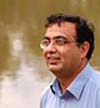 A joint Charles Sturt University (CSU) and CSIRO research team has been recognised for significantly advancing the sustainable management of Australia's water resources, specifically within the irrigation sector.
A joint Charles Sturt University (CSU) and CSIRO research team has been recognised for significantly advancing the sustainable management of Australia's water resources, specifically within the irrigation sector.The Australian Museum’s 2007 Eureka Prize for Water Research and Innovation, sponsored by Land & Water Australia, has been awarded to a team lead by Professor Shahbaz Khan, Professor of Hydrology in CSU’s School of Environmental Sciences. [see Background notes below]
CSU Vice-Chancellor, Professor Ian Goulter, has congratulated Professor Khan, who is a joint appointment with the CSIRO, and his collaborators, and praised the contribution of their work to the sustainability of industries and communities in inland Australia and overseas.
“We are delighted that Professor Khan’s work has been recognised by this highly prestigious award,” Professor Goulter said.
“Irrigated agriculture consumes up 70 per cent of Australia’s water, so this research addresses one of Australia’s most pressing issues in natural resource management – the sustainable management of our water resources.
“Given that Australia's water resources are fully used or even over-allocated in some places, the only way to ensure that we have enough water for future irrigation development and the environment is to use available water more efficiently both on-farm and in catchments.
“This is why is CSU’s practical research, with its partners such as the CSIRO, is so important.”
Professor Khan is leading research in integrated hydro-economic decision support systems linked with geographical information systems for predictive modelling of environmental and economic futures of irrigation areas.
He is currently Chair of the International Steering Committee of the UNESCO’s Hydrology for the Environment, Life and Policy (HELP) Program and the Regional Coordinator for the Australasian region.
Professor Khan and his team have conducted research to improve understanding of water, nutrient and salt balances in the Murrumbidgee River catchments relevant to irrigated agriculture in southern NSW.
“This work provides the first assessment for any catchment in Australia, and is a critical prerequisite for identifying possible water savings and increasing the efficiency of water management for irrigated agriculture,” CSU Pro-Vice-Chancellor for research Professor Paul Burnett said.
“The approach can be broadly applied to other catchments, and the underlying principles are now being applied to a water yield assessment for the whole Murray-Darling Basin in Queensland, New South Wales, Victoria and South Australia. The approach also underpins elements of the Federal Government’s proposed $10 billion National Plan for Water Security.





Social
Explore the world of social